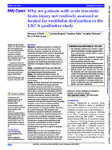Why are patients with acute traumatic brain injury not routinely assessed or treated for vestibular dysfunction in the UK? A qualitative study
| dc.contributor.author | Smith, R | |
| dc.contributor.author | Seemungal, B | |
| dc.contributor.author | Burgess, C | |
| dc.contributor.author | Marsden, J | |
| dc.contributor.author | Tahtis, B | |
| dc.date.accessioned | 2023-02-14T10:46:05Z | |
| dc.date.issued | 2023-01-02 | |
| dc.identifier.issn | 2044-6055 | |
| dc.identifier.issn | 2044-6055 | |
| dc.identifier.other | ARTN e067967 | |
| dc.identifier.uri | http://hdl.handle.net/10026.1/20334 | |
| dc.description.abstract |
<jats:sec><jats:title>Objectives</jats:title><jats:p>Vestibular dysfunction is common in patients with acute traumatic brain injury (aTBI). Persisting vestibular symptoms (ie, dizziness and imbalance) are linked to poor physical, psychological and socioeconomic outcomes. However, routine management of vestibular dysfunction in aTBI is not always standard practice. We aimed to identify and explore any healthcare professional barriers or facilitators to managing vestibular dysfunction in aTBI.</jats:p></jats:sec><jats:sec><jats:title>Design</jats:title><jats:p>A qualitative approach was used. Data were collected using face to face, semi-structured interviews and analysed using the Framework approach.</jats:p></jats:sec><jats:sec><jats:title>Setting</jats:title><jats:p>Two major trauma centres in London, UK.</jats:p></jats:sec><jats:sec><jats:title>Participants</jats:title><jats:p>28 healthcare professionals participated: 11 occupational therapists, 8 physiotherapists and 9 surgical/trauma doctors.</jats:p></jats:sec><jats:sec><jats:title>Results</jats:title><jats:p>Vestibular assessment and treatment were not routinely undertaken by trauma ward staff. Uncertainty regarding responsibility for vestibular management on the trauma ward was perceived to lead to gaps in patient care. Interestingly, the term dizziness was sometimes perceived as an ‘invisible’ and vague phenomenon, leading to difficulties identifying or ‘proving’ dizziness and a tendency for making non-specific diagnoses. Barriers to routine assessment and treatment included limited knowledge and skills, a lack of local or national guidelines, insufficient training and concerns regarding the practical aspects of managing vestibular dysfunction. Of current trauma ward staff, therapists were identified as appropriate healthcare professionals to adopt new behaviours regarding management of a common form of vestibular dysfunction (benign paroxysmal positional vertigo). Strategies to support this behaviour change include heightened clarity around role, implementation of local or national guidelines, improved access to training and multidisciplinary support from experts in vestibular dysfunction.</jats:p></jats:sec><jats:sec><jats:title>Conclusions</jats:title><jats:p>This study has highlighted that role and knowledge barriers exist to multidisciplinary management of vestibular dysfunction in aTBI. Trauma ward therapists were identified as the most appropriate healthcare professionals to adopt new behaviours. Several strategies are proposed to facilitate such behaviour change.</jats:p></jats:sec><jats:sec><jats:title>Trial registration number</jats:title><jats:p><jats:ext-link xmlns:xlink="http://www.w3.org/1999/xlink" ext-link-type="isrctn" xlink:href="ISRCTN91943864">ISRCTN91943864</jats:ext-link>.</jats:p></jats:sec> | |
| dc.format.extent | e067967-e067967 | |
| dc.format.medium | Electronic | |
| dc.language | en | |
| dc.language.iso | en | |
| dc.publisher | BMJ Publishing Group | |
| dc.subject | vestibular neurology | |
| dc.subject | traumatic brain injury management | |
| dc.subject | rehabilitation medicine | |
| dc.subject | qualitative research | |
| dc.subject | concussion managment | |
| dc.title | Why are patients with acute traumatic brain injury not routinely assessed or treated for vestibular dysfunction in the UK? A qualitative study | |
| dc.type | journal-article | |
| dc.type | Article | |
| plymouth.author-url | https://www.ncbi.nlm.nih.gov/pubmed/36592999 | |
| plymouth.issue | 1 | |
| plymouth.volume | 13 | |
| plymouth.publication-status | Published | |
| plymouth.journal | BMJ Open | |
| dc.identifier.doi | 10.1136/bmjopen-2022-067967 | |
| plymouth.organisational-group | /Plymouth | |
| plymouth.organisational-group | /Plymouth/Faculty of Health | |
| plymouth.organisational-group | /Plymouth/Faculty of Health/School of Health Professions | |
| plymouth.organisational-group | /Plymouth/REF 2021 Researchers by UoA | |
| plymouth.organisational-group | /Plymouth/REF 2021 Researchers by UoA/UoA03 Allied Health Professions, Dentistry, Nursing and Pharmacy | |
| plymouth.organisational-group | /Plymouth/Research Groups | |
| plymouth.organisational-group | /Plymouth/Research Groups/FoH - Applied Parkinson's Research | |
| plymouth.organisational-group | /Plymouth/Research Groups/Institute of Health and Community | |
| plymouth.organisational-group | /Plymouth/Users by role | |
| plymouth.organisational-group | /Plymouth/Users by role/Academics | |
| dc.publisher.place | England | |
| dcterms.dateAccepted | 2022-12-15 | |
| dc.rights.embargodate | 2023-2-15 | |
| dc.identifier.eissn | 2044-6055 | |
| dc.rights.embargoperiod | Not known | |
| rioxxterms.versionofrecord | 10.1136/bmjopen-2022-067967 | |
| rioxxterms.licenseref.uri | http://www.rioxx.net/licenses/all-rights-reserved | |
| rioxxterms.type | Journal Article/Review |


